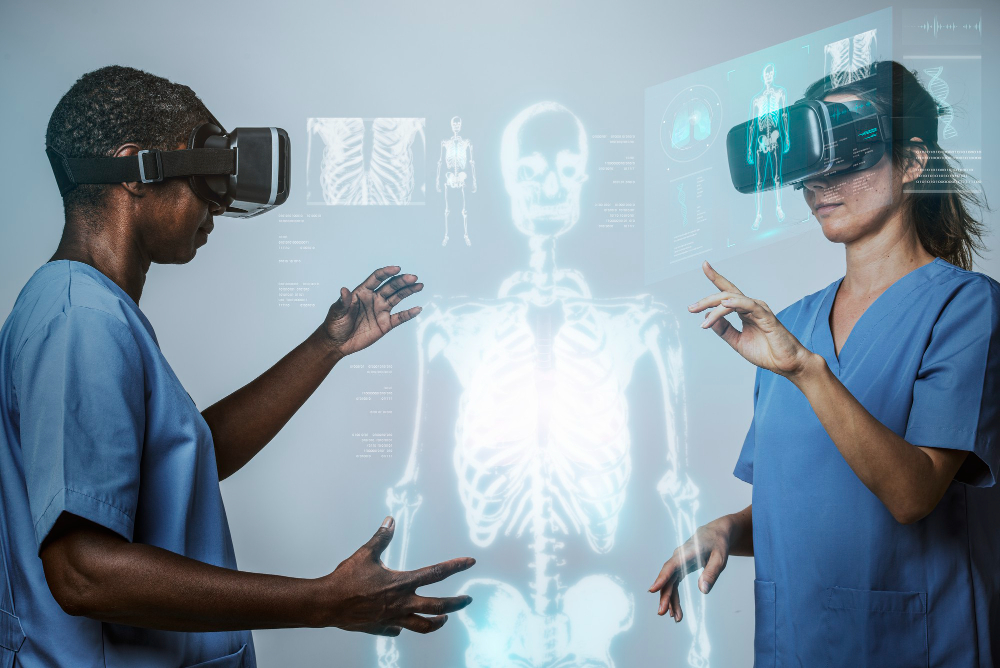- March 24, 2023 2:59 pm
- by Manek
- March 24, 2023 2:59 pm
- by Manek

The fast advancement of the medical industry has raised life expectancy globally, but as the aging population, healthcare systems must deal with a rise in patient volume, rising expenditures, and medical employees. Artificial Intelligence (AI) and Machine Learning (ML) in healthcare will take an active role in healthcare transformation in the upcoming years by promoting advancements, facilitating the handling of medical data, and enhancing the treatment of long-term diseases.
Healthcare is gradually integrating artificial intelligence (AI) technologies that are widely used in modern business and daily life. Artificial intelligence has the opportunity to aid professionals in many areas of patient care and operational procedures, enabling them to build on existing strategies and solve problems more quickly.
Artificial intelligence (AI), which relies on automation, has the potential to transform healthcare and assist in resolving some of the issues involved in the healthcare sector. AI has the potential to enhance both the effectiveness and productivity of healthcare services. Additionally, it can make healthcare professional’s daily lives better by allowing them to spend more time caring for patients, which will boost staff motivation and improve engagement. It can even speed up the release of life-saving medications
AI is currently being employed to more precisely and early diagnose diseases like cancer. AI is also being used in connection with the growth of medical devices to detect early-stage heart disease, allowing doctors and other clinicians to more accurately track and identify potentially serious situations at earlier and more curable stages.
Prescriptive modeling can aid clinical decision-making and implement strategic administrative functions. Improving treatment involves the alignment of massive health data with suitable and efficient decisions. Another area where AI is starting to take root in healthcare is the use of pattern recognition to identify people at risk of getting sick or seeing it progress owing to lifestyle, genomic, or other causes.
AI can assist health care professionals in taking a more consistent approach to disease diagnosis, help organize treatment plans, and help patients to more effectively handle and cooperate with their long-term therapies, in addition to helping providers identify patients who may be at risk for severe situations.
Through the use of technology like natural language processing (NLP), chatbots enable patients to ask questions about appointments, payments, and other matters. In order to lessen the burden on the medical staff, chatbots also interact with patients regarding their sicknesses and concerns. Additionally, chatbots help patients by providing the necessary solutions, freeing up healthcare professionals to concentrate on other responsibilities. In addition to engaging patients, this healthcare solution also provides them with advanced service and improves the quality of care.
Virtual health assistants are in charge of a variety of tasks, such as answering regular patients' messages and calls and keeping their patient info while protecting private information, setting up doctor visits, reminding patients of proper consultations and clinical meetings, etc. It is one of the most helpful AI applications in healthcare that provides patients with a tailored experience in handling their health and resolving their worries. It minimizes the number of hospital sessions, which is advantageous to both patients and medical professionals.
Considering that even one extra dose of a medication or drug might have serious effects on a patient's body, it's crucial that the patient consumes the recommended dosage in a timely manner. Otherwise, there can be severe consequences. Artificial intelligence will enable the pharmaceutical sector to lower the potential for prescription errors.
Machine learning is a division of artificial intelligence that replicates how humans learn using algorithmic techniques and data. As more information is given to it over time, it becomes more accurate. Machine learning is utilized in healthcare to enhance performance and remarkable patient care by utilizing data and minimizing human engagement. The advantages of machine learning in healthcare described here will give you a better idea of how it operates.
By strengthening procedures and lowering administrative expenses, record digitization contributes to the provision of quality patient care.
By gathering, analyzing, categorizing, and deleting data, a large number of health informatics specialists contribute to data security. With high-level resolution imaging technologies like MRIs and CT Scans, ML helps doctors gain detailed information. ML also advances our knowledge of the harmful bacteria and viruses that endanger human life.
As the ML system learns to assign patients for only high-value tests, there should be fewer chances of over-testing as a result of improved diagnostic accuracy. With the development of ML technology, advancements and ecosystems, such as augmented reality and the Internet of Things, are influencing the life and health sectors. Radiologists and anatomical pathologists will benefit greatly from the use of ML systems based on medical imaging recognition. It is possible that many of the duties currently carried out by doctors and other critical care workers will be simplified using ML models used with streaming data.
ML in healthcare organizations can streamline procedures, boost productivity, and ultimately deliver better patient care. To simplify the processing of massive volumes of data, ML is increasingly being employed in the healthcare industry. Since computing power has grown, it has become more cost-efficient and accessible. It makes technology-enabled healthcare accessible, which enhances therapies, R&D effectiveness, and the production of new equipment.
ML is also applied to enhance the standard of care in the medical field. Programs that evaluate a patient's risk of getting a disease or their likelihood of surviving can be developed by healthcare providers using machine learning (ML). It is utilized in healthcare to automate diagnostic procedures. It has almost universal adoption and has the ability to address some of mankind's most serious issues, such as illness detection.
Using ML methods like deep learning, it is now possible to identify minute abnormalities in scanned radiographs of patients, enabling health professionals to give a precise reports. In the past, techniques like x-rays and CT scans were sufficient for evaluating minor defects, but as diseases became more common, it became essential to systematically analyze them.
Today, the globe is taken over by ML and AI. The healthcare sector is being significantly changed by these technologies, which have enabled everything including medical research and therapy. Scientists are creating ML and AI algorithms for the early diagnosis of serious diseases. Today's lab diagnostics, image and cycle monitoring, theoretical approaches to data analysis, and computer-aided medical operations including organ recognition and tissue categorization all require the use of machine learning (ML) and artificial intelligence algorithms. We hope that this blog helped to provide brief learning regarding the role of AI and ML in the healthcare industry.
Guaranteed Response within One Business Day!

Exploring the Phases of eCommerce Development: A Comprehensive Guide

The Complete Guide to Outsourcing Software Development

Choose the Right Software Development Methodology: Agile vs. Waterfall vs. Hybrid

The Importance of Cybersecurity in Software Development

How to Manage Communication & Collaboration With Your Offshore Software Development Team